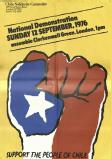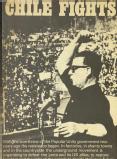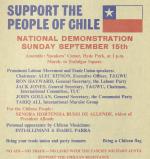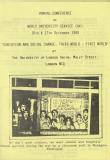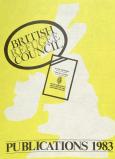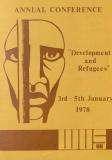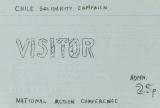National Organisations
A variety of different organisations were formed in the UK in response to the Chilean coup. The Chile Solidarity Campaign and the Chile Committee for Human Rights, among others, were formed in order to provide solidarity with the Chileans and to raise British public awareness of the events taking place in Chile. These organisations worked alongside trade unions in order to pressure the government.
The Chile Solidarity Campaign established a series of branches across the UK and co-ordinated regular demonstrations, cultural festivals, conferences and art exhibitions. They also created a variety of different schemes such as ‘adopt a prisoner’. Anyone could choose to ‘adopt’ a political prisoner in Chile as the procedure was relatively simple. It entailed writing to the prisoner to inform them of their ‘adoption’, telling their family and the local authorities. With the support of their trade union, the adopter would campaign for the release of the prisoner and attempt to put pressure on the Chilean authorities. According to archive materials from the Chile Solidarity Campaign, over 40 UK trade union branches participated in the scheme by 1975. The scheme was successful, according to the World University Service, since it led to the freeing of several hundred people. Two hundred of these came to the UK.
In response to the coup the World University Service (WUS) created their Chile programme which was the biggest of all of the UK based campaigns. Various UK organisations helped to assist the movement and settlement of political exiles. The WUS alone assisted 900 refugees to come to the UK. It not only arranged for them to settle in Britain, but also funded the education of many. The WUS scheme focused on students and academics who were unable to continue studying or working in Chilean universities due to government repression. Many WUS scholarship holders went on to complete undergraduate and postgraduate degrees, and to establish successful professional careers.
The Joint Working Group was another key organisation delivering aid to refugees. It comprised various bodies such as: the British Council for Aid to Refugees, the Chile Committee for Human Rights, Christian Aid, the Ockenden Venture, the Chile Solidarity Campaign, and the World University Service. Together the Joint Working Group assisted with every aspect of the exiles’ resettlement: travel, housing, health checks, integration into the local community, English language teaching, further education, and job applications. Collectively, the Joint Working Group could profit from each member organisation’s speciality. In the case of the WUS, for example, its capacity to help with education and training was important. Co-ordinating the Joint Working Group, however, was challenging. It was difficult to predict the numbers of exiles who might arrive in the UK, which meant that forecasts for funding could only be made on a short-term basis. Nevertheless, the Joint Working Group provided an essential service for the exiles and supported them in their resettlement.

